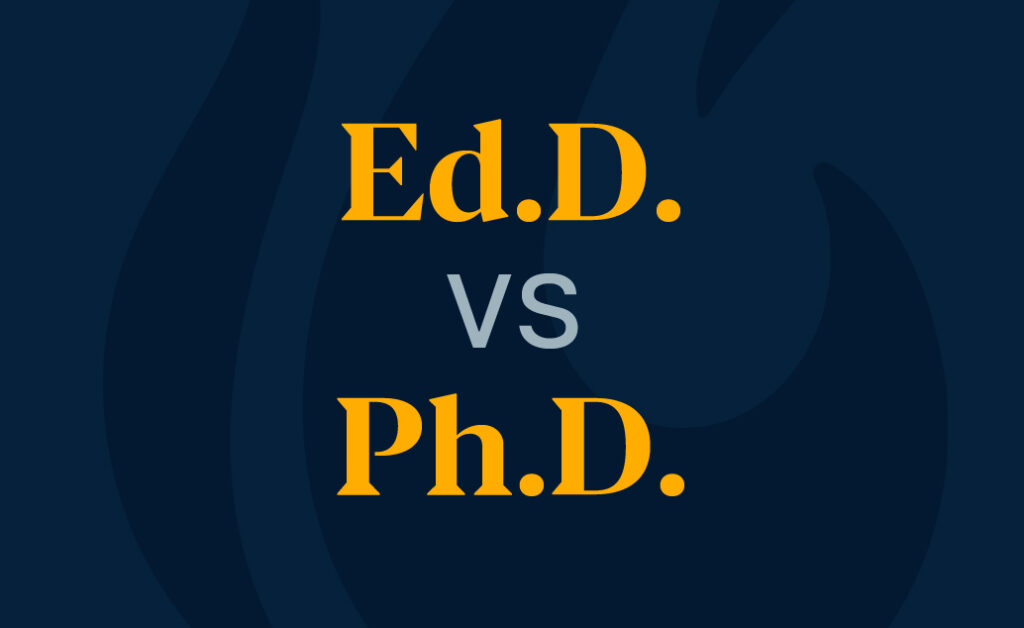
Professionals who want to advance their careers in fields such as education, business, nursing and healthcare frequently consider further education. Earning a doctoral degree can be an effective tool for career advancement as well as a wonderful life and academic achievement.
When pursuing a doctoral degree, there are different tracks that prospective students can take. To help you determine what type of doctoral degree will best serve your career aspirations, here is a breakdown of the key differences between Ed.D. and Ph.D. degrees.
What is an Ed.D.?
An Ed.D., which is short for Doctor of Education, is a practitioner-focused degree that is designed for professionals aspiring to leadership roles in a variety of educational fields. You can typically complete an Ed.D. program in two to three years.
What is a Ph.D.?
Short for Doctor of Philosophy, a Ph.D. is a degree that is more heavily focused on research and theory. Ph.D. programs typically take five or more years to complete. (As a personal example, I earned my Ph.D. in Clinical Psychology from a research-intensive program that required a five-year, full-time commitment.)
What are the main similarities between an Ed.D. and a Ph.D.?
Both degrees are at the doctoral-level and are considered terminal degrees. In other words, they represent the highest level of education that can be earned in a particular field. In addition, both degrees take multiple years to complete, and both degrees require a fair amount of writing and research.
What are the main differences between an Ed.D. and a Ph.D.?
One of the primary differences between these degrees is that the Ed.D. is more focused on practical applications, while the Ph.D. is more geared toward theory and original research. Additionally, Ed.D. programs usually have a lower cost and shorter time to completion compared to Ph.D. programs.
What are some common career options for those with an Ed.D.?
The Ed.D. is an outstanding option for individuals who wish to lead others and implement change in their organizations. Moreover, the Ed.D. is a focused degree with a wide range of career options, including:
- College or university president
- Dean
- Director of human resources
- Educational consultant
- Policymaker or analyst
- Principal
- Provost
- Superintendent
What are some common career options for those with a Ph.D.?
A Ph.D. degree is ideal for anyone interested in pursuing a career in research, academia, educational consulting or policy analysis. Career opportunities with a Ph.D. may include:
- Community developer
- Consultant
- Director of research
- Human resource manager
- Policy analyst
- Program manager
- Research analyst
- Statistician
What are the employment projections for doctoral degree holders?
According to the Bureau of Labor Statistics, individuals who earn a doctoral degree in education have relatively high earnings and also have low unemployment rates. In 2023, doctoral degree holders achieved median weekly earnings of $2,109 and a 1.2% unemployment rate. In comparison, master’s degree holders attained median weekly earnings of $1,737 and an unemployment rate of 2%.
Additionally, the job outlook is very strong for postsecondary teachers and postsecondary education administrators, two professions where doctoral degrees are often required. (Postsecondary education is defined as education beyond the high school level and is often tied to higher education institutions.) According to the Bureau of Labor Statistics, postsecondary teachers in 2023 earned a median annual pay of $83,380 and there is projected job growth of 8% for 2022 – 2032. For postsecondary education administrators in 2023, the median annual pay was $102,610 per year with a projected job growth of 4% for 2022 – 2032.
Is an Ed.D. or a Ph.D. better?
Both the Ed.D. and the Ph.D. are advanced degrees that represent the highest levels of academic achievement. Regardless of which path an individual ultimately chooses, there is high potential for career advancement.
Ultimately, the best option for you comes down to your preferred path, career goals and values. If you are seeking a job as a researcher and scholar, a Ph.D. is better aligned to your goals. If you are more interested in seeking leadership positions that blend practice with research, an Ed.D. may be an ideal path toward your personal and professional goals.
At a glance: Ed.D. vs. Ph.D.
| Doctor of Education (Ed.D.) | Doctor of Philosophy (Ph.D.) | |
| Degree Type | Professional degree designed for individuals pursuing practitioner roles in leadership | Academic degree designed to prepare individuals for research and teaching roles |
| Curriculum | Focused on practical applications | Focused on research and theory |
| Typical Duration | Two to three years | Five years or more |
| Cost | Typically lower | Typically higher |
| Degree Applications | Administration, leadership, policymaking, higher education | Research, teaching, consulting |
American College of Education offers high-quality, fully online Ed.D. programs for under $24,000, designed to help students build their leadership capacity through practical applications of research theories. Learn more about our doctoral degrees here.

